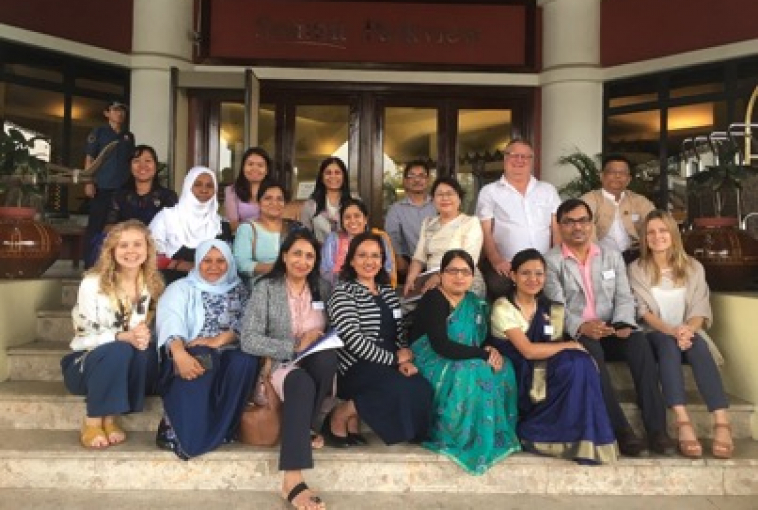FIGO/WHO Family Planning Training Workshop in Myanmar

Strengthening sexual and reproductive health services has far reaching benefits in terms of the overall health of a nation.
FIGO has been working in collaboration with the World Health Organisation (WHO) since 2016 to promote and disseminate the use of WHO Best Practice Guidelines and Tools in Family Planning, through training and capacity building of health staff through our FIGO member societies. The FIGO/WHO Accelerator Project builds on previous rounds of the initiative, aiming to increase awareness and use of WHO Family Planning Guidelines and Tools, and moving the family planning agenda forward in participating countries, helping them to work towards achieving SDG 3 and SDG 5 targets.
The first activity in this round commenced with a regional training workshop held in Yangon, Myanmar, as partnership between the WHO, FIGO and the Myanmar Medical Association. Participants from Nepal, India, Myanmar and Tanzania attended the workshop, which was moderated by Dr Petrus Steyn and Dr Rita Kabra from the WHO, alongside Dr Anita Makins and Annabel Miller from FIGO. The meeting was convened by Professor Aye Aung, President of the Obstetrical and Gynaecological Society, of the Myanmar Medical Association. We were also pleased to have the participation of Professor Hnin Hnin Lwin, deputy director of women’s health at the Myanmar Ministry of Health.
A range of health service providers involved in family planning, including OBGYNs, midwives, policy makers and representatives from the local WHO office attended and received training throughout the workshop. Ensuring that policy makers, as well as health service providers, receive orientation in up to date family planning guidelines, is important in facilitating widespread dissemination and use of resources.
The guidelines and tools disseminated included: the 5th edition of the ‘Medical Eligibility Criteria (MEC) for contraceptive use’, the MEC wheel,‘Selected Practice Recommendations for Contraceptive Use’, the ‘DMT on Family Planning’ and the ‘Family Planning Global Handbook for Providers’. There were also updates on specific issues in family planning, including WHO evidence based guidelines on contraceptives for adolescents, as well as new contraceptive methods. Dr Anita Makins, FIGO’s PPIUD project director gave a presentation specifically on the post-partum intrauterine device initiative and its success across the six countries in which the FIGO Initiative has worked.
Mwanaisha Juma Fakih, a midwife who attended the workshop from the Republic of Tanzania, highlights why these tools and resources are so useful to service providers:
“WHO guidelines and tools in Family Planning are very useful resources because they give health care provider’s high quality and standardised guidance, assisting men and women in accessing safe and effective methods of Family Planning. The tools and guidance are an easy way of ensuring a quality service in contraceptives, which in turn reduces neonatal and maternal morbidity and mortality.”
As well as training, the workshop provided a platform for experience sharing on family planning service provision between the different countries and types of health provider. Dr Sougata Burman, presented on task sharing between OBGYN’s and nurses in JMN Hospital, Kalyani, India, and how task-sharing increased the accessibility of post-partum family planning to women during the PPIUD initiative.
Following the workshop, participants will conduct training of trainers (TOT) workshops in their own countries, to disseminate and roll out their training at local and national levels. Professor Heera Tuladhar, President of the Nepalese Society of O&G, NESOG, outlined the importance of rolling this training out at a national level:
“The training we received needs disseminating widely at a national level, as many of our members are not aware of the important updates which have made to previous guidelines. These guidelines are essential for standardisation in family planning service provision in Nepal. We plan to roll out the training we received at a national level, to our society members.”
FIGO recommends the use of the best practice tools and guidelines in family planning for all health care providers, to ensure women and their families around the world are receiving high quality and effective family planning care. These tools and guidelines should be disseminated widely amongst training bodies, health care providers and policy makers.